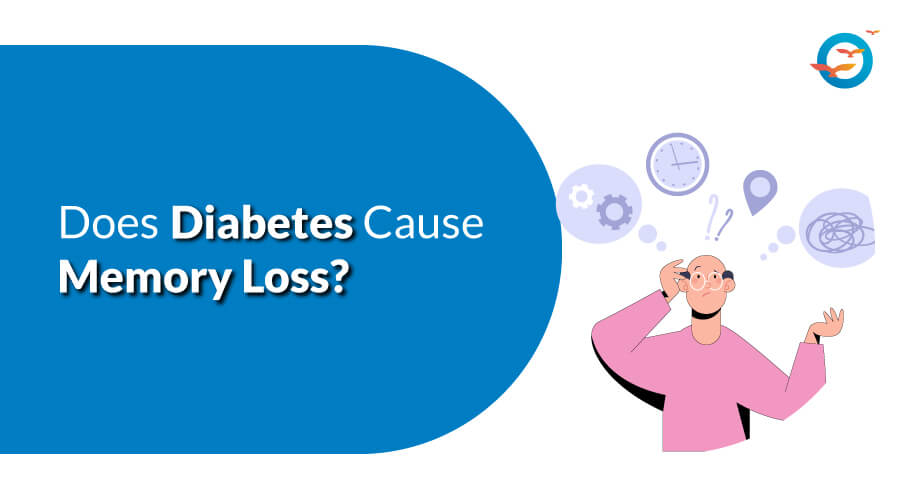Does Diabetes Cause Memory Loss?

Type 2 Diabetes and Memory loss
A huge percentage of the world’s population suffers from type 2 diabetes. And the number is growing daily, driven by increasingly sedentary lifestyles, unhealthy diets, and daily stress.
What is type 2 diabetes?
Type 2 diabetes is the most common type of diabetes today, and it is caused by a phenomenon known as insulin resistance. This occurs when either the insulin produced by a person’s pancreas doesn’t function as it should or the pancreas does not produce sufficient insulin.
As a result, insulin is unable to do its job, which is to move glucose (sugar) obtained from your diet, into the muscle cells. As a result, your blood sugar levels (BSL) rise. Another effect is that the resistance prompts the pancreas to increase the production of insulin. Uncontrolled, long-term type 2 diabetes is known to cause a number of health complications, including:
- Heart damage
- Stroke
- Vision problems
- Kidney damage
- Damage to the Central Nervous System (CNS)
- Digestive ailments
- Infertility in both sexes
What is memory loss?
Memory loss is a natural effect of aging. However, there is some difference between age-related memory loss and memory loss from degenerative diseases, like Alzheimer’s. It is quite natural to forget names or faces as one grows older, and it doesn’t usually impact one’s independence. However, there are some signs that need medical attention, as they could signal the onset of dementia, for instance:
- Forgetting common words
- Repeating questions again and again
- Losing one’s way
- Sudden mood shifts
- Inability to follow simple instructions
Alzheimer’s disease (AD) is one of the most common types of dementia and some studies suggest that it may be linked to high blood sugar levels
The link between diabetes and memory loss
High blood sugar, if left unmanaged, will over time, cause damage to almost every organ and system in the body—and that includes blood vessels of the brain. If such damage occurs, it will cause cognitive problems and a condition known as vascular dementia.
There is also some research that points to a close connection between insulin signaling and glucose metabolism in the brain. When insulin receptors in the brain senses an imbalance in insulin levels in the body—which typically, as we have seen, happens with diabetics—it increases the risk of AD significantly.
Memory Loss: Risk Factors
Age:
Older people are more prone to memory problems and dementia-like Alzheimer’s. Studies estimate that about one in eight people over 65 years of age suffers from some form of dementia or the other, to some degree.
The numbers grow worse as one grows older: nearly 50% of all people over 85 are said to be facing dementia.
Genes
Diabetics with a family history of Alzheimer’s are at higher risk of contracting dementia than others. Research suggests that people with a parent or sibling suffering from AD is more likely to develop the disease themselves.
Prevention
One of the most basic acts diabetics can take to lower their risk of memory loss and dementia is to get their BSL in the normal range. There are several actions one can take to cut their risk and prevent/control diabetes, including:
1. Losing weight—especially belly (midsection) fat
- Get more exercise: Aim to get at least 150 minutes a week.; and include cardiovascular activity, resistance training, and balance & flexibility movements
2. Eat a healthy diet
- Lose all fried, salty, high-sugar, high GI foods, in favor of plant-based foods.
3. Use your brain
- There is a lot of evidence to suggest that activities like Sudoku, Chess, playing a musical instrument, etc. keep the brain active and help reduce the risk of contracting Alzheimer’s.
4. Do not smoke
- Reduce or stop alcohol consumption
Do you want to know more about Diabetic and Retinopathy, visit our blog.
Conclusion
So, if you’re suffering from diabetes, there’s really no better time to start getting your blood sugar levels in the normal range than right now. The right diet-exercise-stress management routine, will not just improve your BSL, but even completely reverse diabetes.
At Freedom from Diabetes, we regularly conduct programs to help diabetics get free of the medicines. We also share a lot of information to guide and help people suffering from insulin-resistance-related disorders—BP, PCOD/S, Obesity, Cholesterol, etc.—improve their health. To learn more, visit our website: www.freedomfromdiabetes.org and our Youtube Channel and Facebook page.
FAQs
What is memory loss?
Memory loss is a condition where people are not able to remember the information. They have an issue with forgetting things. Age-related memory loss is natural.
Is there a link between type 2 diabetes and memory loss?
Yes, prolonged high blood sugar levels can damage brain blood vessels, increasing the risk of cognitive issues and vascular dementia. Insulin imbalances in diabetics can also raise the risk of Alzheimer’s disease.
What are the risk factors for memory loss in diabetics?
The key risk factors include,
Age: People over 65 are more prone to dementia, with higher risks for those over 85.
Genes: A family history of Alzheimer’s increases the risk, especially in diabetics.

